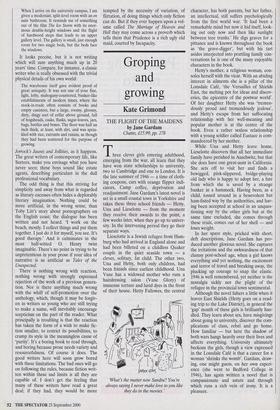Groping and growing
Kate Grimond
THE FLIGHT OF THE MAIDENS by Jane Gardam Chatto, £15.99, pp. 278 Three clever girls entering adulthood, emerging from the war, all learn that they have won state scholarships to university, two to Cambridge and one to London. It is the late summer of 1946 — a time of cloth- ing coupons, cars with orange flipper indi- cators, Camp coffee, deprivation and readjustment. Jane Gardam's latest novel is set in a small coastal town in Yorkshire and takes these three school friends — Hetty, Una and Lieselotte — from the moment they receive their awards to the point, a few weeks later, when they go up to univer- sity. In the intervening period they go their separate ways.
Lieselotte is a Jewish refugee from Ham- burg who had arrived in England alone and had been billeted on a childless Quaker couple in the quiet seaside town — a clever, solitary, fat child. The other two, Una and Hetty, both only children, had been friends since earliest childhood. Una Vane has a widowed mother who runs a hairdressing salon (Vane Glory) of immense torture and lurid dyes in the front of their house. Hetty Fallowes, the central `What's the matter now Sandra? You're always saying I never make love to you like they do in the movies.' character, has both parents, but her father, an intellectual, still suffers psychologically from the first world war. 'It had been a remarkable mind but now it hid itself, look- ing out only now and then like sunlight between tree trunks.' He digs graves for a pittance and is known throughout the book as 'the grave-digger', but with his tart asides interjected into prattling family con- versations he is one of the many enjoyable characters in the book.
Hetty's mother, a religious woman, con- soles herself with the vicar. With an abiding interest in ailments she is a pillar of the Lonsdale Café, 'the Versailles of Shields East, the melting pot for ideas and discov- eries, the epicentre of the postwar world'. Of her daughter Hetty she was 'tremen- dously proud and tremendously jealous', and Hetty's escape from her suffocating relationship with her well-meaning and popular mother is at the centre of the book. Even a rather sexless relationship with a young soldier called Eustace is com- mandeered by her mother.
While Una and Hetty leave home, Lieselotte discovers that all her immediate family have perished in Auschwitz, but that she does have one great-aunt in California. She sets off to visit her and finds a bewigged, pink-slippered, bridge-playing old lady who is happy to adopt her, a fate from which she is saved by a strange banker in a hammock. Having been, as a child, tossed around in a benevolent but ham-fisted way by the authorities, and hav- ing been accepted at school in an unques- tioning way by the other girls but at the same time excluded, she comes through these trials, comes out of her shell — and loses weight.
In her spare style, pricked with short, deft descriptions, Jane Gardam has pro- duced another glorious novel. She captures the irritations and the awkwardness of that clumsy post-school age, when a girl knows everything and yet nothing, the excitement and terror of travel and breaking away, the plucking up courage to snap the elastic. 1946 is well remembered, yet neither is the nostalgia sickly nor the plight of the refugee in the provincial town sentimental.
Although the novel falters a little when it leaves East Shields (Hetty goes on a read- ing trip to the Lake District), in general the `gap' month of these girls is brilliantly han- dled. They learn about sex, have misgivings about going to university, discover the com- plications of class, rebel and go home. How familiar — but here the shadow of both wars hangs heavily over their lives and affects everything. University ultimately beckons the girls, though a view expressed in the Lonsdale Café is that a career for a woman 'shrinks the womb'. Gardam, draw- ing, one might guess, on her own experi- ence (she went to Bedford College in 1946), has again written a novel that is compassionate and astute and through which runs a rich vein of irony. It is a pleasure.






















































































 Previous page
Previous page